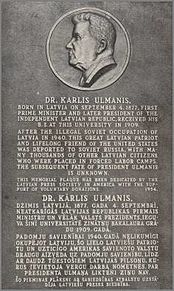Kārlis Ulmanis
Kārlis Ulmanis (b. September 4, 1877 in Berze, Latvia – d. September 20, 1942) was the most prominent Latvian politician in pre-World War II Latvia during the Latvian period of independence from 1918 to 1940.
Ulmanis studied agriculture at the ETH Zurich, Switzerland, and at Leipzig University, Germany, and then worked in Latvia as a writer, lecturer, and manager in agricultural positions. He was politically active during the 1905 Revolution, was briefly imprisoned in Pskov, and subsequently fled Latvia to avoid incarceration by the Russian authorities. During this period of exile, Ulmanis studied at the University of Nebraska in the United States, earning a Bachelor of Science degree in agriculture. After working briefly at that university as a lecturer, Ulmanis moved to Houston, Texas, where he had purchased a dairy business.
Ulmanis returned to Latvia from exile in 1913, after being informed that it was safe to return due to the declaration of a general amnesty by the Russian tsar. This safety was shortlived as World War I broke out one year later.
In the aftermath of the war, Ulmanis was one of the principal founders of the Latvian People's Council (Tautas Padome), which proclaimed Latvia's independence from Russia on November 18, 1918. A constitutional convention established Latvia as a parliamentary democracy in 1920. Ulmanis was the first Prime Minister of a Latvia which had become independent for the first time in 700 years. He also served as Prime Minister in several subsequent Latvian government administrations during the period of Latvian independence from 1918 to 1940. In addition, he founded the Latvian Agrarian (Farmer's) Union, one of the two most prominent political parties in Latvia at that time.
On May 15, 1934, due to the economic repercussions of the Great Depression and the political and military dangers faced by Latvia from the rise to power of aggressive governments in Germany and Russia, Ulmanis as Prime Minister dissolved the Legislature or Saeima and established executive non-parliamentary authoritarian rule. The incumbent President Alberts Kviesis was allowed to serve the rest of his term until 1936, after which Ulmanis unconstitutionally merged the office of President and Prime Minister in his own person.
In spite of this bloodless political coup, Ulmanis was a popular leader during whose leadership Latvia recorded major achievements. During Ulmanis' rule, education was strongly emphasized and literacy rates in Latvia reached the highest levels in Europe. Due to an application of the economics of comparative advantage, the United Kingdom and Germany became Latvia's major trade partners, while trade with Russia was reduced. At a time when most of the world's economy was suffering, Latvia could point to increases in both gross national product (GNP) and in exports of Latvian goods overseas.

In 1939, Hitler's Germany and Stalin's Russia signed a secret protocol, the Molotov-Ribbentrop Pact, dividing Eastern Europe into spheres of influence and confirming Ulmanis' worst fears concerning both nations. Latvia was thereby assigned to the Russian sphere, and in 1940, Latvia was forcibly occupied by the Soviet Union. Ulmanis ordered Latvians to show no resistance to the Soviet Army, against whom they had no chance of military defense. The phrase "I will remain in my place and you remain in your places" from his radio speech on this occasion is still famous, and may have saved lives, although Latvia still lost more than a third of its population during the Second World War.
Although the U.S. State Department had information at that time that the Soviet Union had agreed to exile Ulmanis to Switzerland, he was in fact arrested by the Soviets and deported to points unknown. His fate was only learned in the post-Gorbachev era. Ulmanis is now known to have died in a prison in Krasnovodsk in the present Turkmenistan during World War II.
Ulmanis remains a popular if also controversial figure in modern-day Latvia. Many Latvians view him as a symbol of Latvia's independence in pre-World War II Latvia. Others credit Ulmanis for the rise of Latvian economic prosperity in the 20th century. Others think that someone who disbanded Parliament and adopted a form of executive, if benevolent, authoritarian rule cannot be regarded as a positive figure, even if that rule was a relatively prosperous one. One sign that Ulmanis is still very popular in Latvia is the election of his grand-nephew Guntis Ulmanis as President of Latvia in 1993.
External links
1 - Anatolijs Gorbunovs assumed presidential duties upon the restoration of Latvian independence in 1990.
